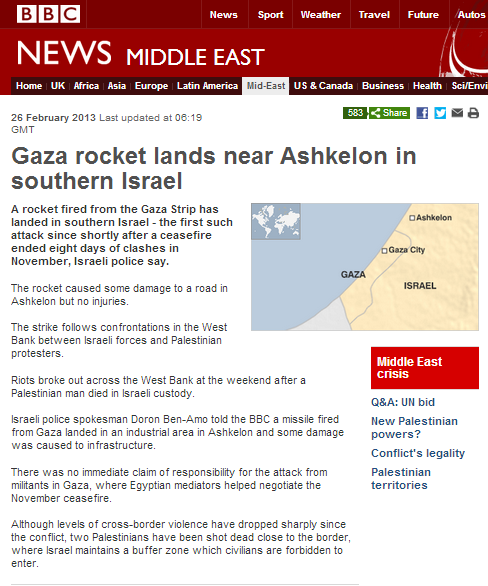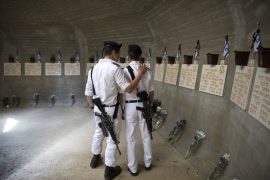On the morning of Tuesday, February 26th 2013 an M75 missile was fired from the southern Gaza Strip at the town of Ashkelon, violating the ceasefire which brought Operation Pillar of Cloud to an end in November of last year. Fortunately, no injuries were sustained.
The BBC’s report on the subject appeared in the Middle East section of its BBC News website.

Contrary to the statement made in the BBC article (and still not corrected 24 hours later), the missile fire was claimed by the Al Aqsa Martyrs Brigades and declared to be in response to the “murder” – as they called it – of Arafat Jaradat, adding:
“We must resist our enemy by all available means,” the group said in a statement emailed to reporters. “We stress our commitment to armed struggle against the Zionist enemy.”
Our friends over at The Commentator have some interesting observations regarding the linkage suggested in this short article between the rocket fire and the ongoing riots in Judea and Samaria which – contrary to the statement in this article – did not ‘break out’ “at the weekend after a Palestinian man died in Israeli custody”, but are an escalation of a chain of violent incidents in that area over the past few months.
Note too the report’s final paragraph:
“Although levels of cross-border violence have dropped sharply since the conflict, two Palestinians have been shot dead close to the border, where Israel maintains a buffer zone which civilians are forbidden to enter.”
This description whitewashes the fact that since the November ceasefire, there have been repeated attempts by Palestinians from Gaza to damage and breach the border fence (mostly unreported by the BBC), instead implying that Israel shoots Gazans simply because they happen to be in the wrong location.
The incidents referred to in that distorted paragraph are this one and this one.
The BBC article also fails to point out that the M75 missile was developed by Hamas and is produced in the Gaza Strip, suggesting some degree of Hamas involvement in the incident.



